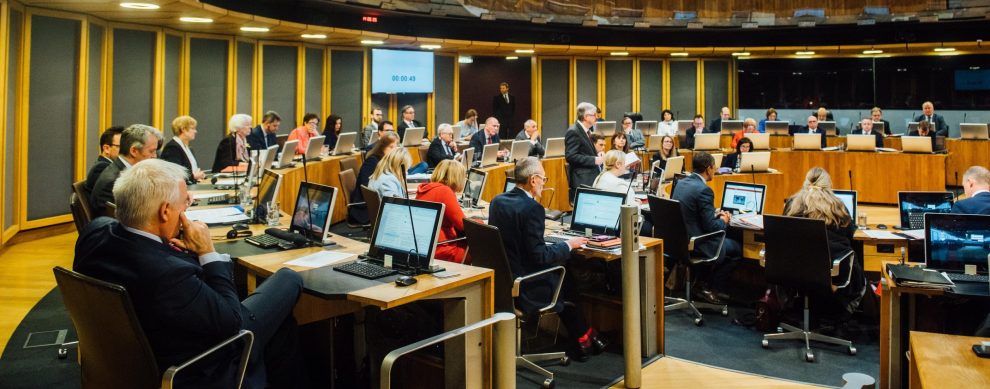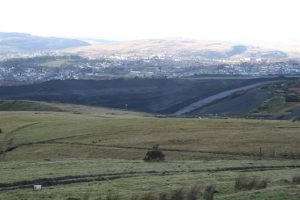All votes have been cast.
Political debate will have quickly moved on from election division lines to who won and who lost and on to the composition of the next Welsh Government.
There seems to me to be only two games in town, writes Jonathan Edwards MP.
A minority Labour Administration possibly propped up with an isolated Lib Dem or/and Green MS. If this transpires, the political landscape in Wales would hardly have changed, and expect five more years of managed Labour decline.
In such a circumstance, expect the polarisation between independence and abolish to accelerate, especially as an expected referendum in Scotland will inevitably turbo-boost the constitutional debate in Wales.
If Labour performs poorly, then the focus will move quickly to a One Wales 2 arrangement between Labour and Plaid Cymru.
Despite my protestations that the most natural coalition in Welsh politics is between Labour and the Tories, I don’t expect Mark Drakeford to be inviting Andrew RT Davies up to the 5th Floor of Ty Hywel for Coffee and Biscuits.
Some might ask why a nationalist party like Plaid Cymru would even consider supporting the hegemony of a unionist Labour party and their tribal grip on all aspects of Welsh life.
MAKING THE DECISION
In politics, alas, nothing is black and white.
In terms of process, whether Plaid Cymru deal or no deal will be decided firstly by the new Plaid Cymru Senedd Group.
They will then set a recommendation for endorsement by the wider party in a special conference.
This is key to understanding what is likely to happen as many Plaid Cymru.
Senedd Members have spent two terms in opposition and will be desperate to see their policy programme implemented.
It’s one thing as a politician to have transformational ideas; the big prize comes with seeing them come to fruition.
The politics of most MSs is shaped mainly by the institutional politics of the Senedd as opposed to the broader national context. The new Plaid Group will also likely contain many new, young faces.
Although great for party renewal, with some new and serious talent elected, are they likely to challenge more senior members in their first few weeks as elected members?
Whatever the result of the election for Plaid will also move them towards wanting to make a deal.
If Plaid secures a good result in the high teens, another stint in government would be seen as just rewards.
If Plaid performs poorly with a low teen tally, then entering government might be the only way for the Leadership to survive.
Furthermore, being relevant is everything in politics. Being in government would provide a platform that would be denied to the third party in the Senedd.
I would expect the Welsh civil service to have composed a draft One Wales 2 programme of government well in advance.
This will provide a basis for agreement with some fine-tuning by the politicians.
The deal would then be implemented either in the form of a formal coalition or a supply and confidence arrangement.
OPPORTUNITIES AND DANGER
One Wales 2 provides all sorts of opportunities and dangers for Plaid Cymru and the national movement.
The obvious danger is that junior coalition partners, be it formal or informal, tend to get eviscerated at the next set of elections.
The policy programme might be Plaid’s, but Labour will get the glory.
When the party agreed to the original One Wales, this was priced into the deal. Self-sacrifice has always been a critical component of nationalist politics. The agreement was signed in the full knowledge that the next Assembly elections would be tough.
However, the deal contained the prize of a referendum on law-making powers that was won, despite the last-minute efforts of Peter Hain and Rhodri Morgan to de-rail the key red line on the eve of the poll.
History will judge Ieuan Wyn Jones kindly for how he stood firm and delivered a vote that set Wales on the pathway to greater autonomy – until Brexit turned the tables.
On this basis, the problem with One Wales 2 is that Labour can’t offer Plaid Cymru anything this time, as they are not the governing party in Westminster.
Considering the talents of some of the Plaid MSs likely to get Ministerial posts, they will have the confidence to run rings round their Labour colleagues and hope to drive all sort of political wedges into the Labour party.
There is a feeling that Plaid Ministers in the One Wales coalition played a straight bat and put country before party. Expect a different approach this time with the tail wagging the dog.
Some serious thinkers in the national movement believe that the Labour party will ultimately be the delivery device for independence.
Considering there usually is only room for two narratives in politics, a One Wales 2 Government could provide the basis for a polarisation narrative between Wales and Westminster.
STRONG GOVERNMENT MUST STAND UP TO WESTMINSTER
Wales will undoubtedly need a strong government uniting the national and Labour movements against the onslaught coming from Westminster.
Others would argue that the pro-Wales sentiments put forward by some Labour MSs don’t reflect the feeling of the broader Labour movement.
The notion that Labour MPs representing Welsh constituencies in Westminster support meaningful Home Rule for Wales is off the scale of reality.
From experience, whenever Labour must choose between the interests of Wales and the interests of the Labour party, Wales doesn’t even come second.
Labour MPs in England are often entirely hostile to devolution.
Ultimately, despite whatever Mark Drakeford declares, he must report to London bosses who probably aren’t as well-rehearsed in Confederal models.
The original One Wales was by far the most visionary Welsh Government since 1999. A second outing would undoubtedly give much energy to the next Welsh Government – essentially Plaid policies delivered by Labour voters.
Some would argue that a competent Welsh Government delivering a radical agenda would increase support for greater autonomy.
That is the most important consideration.
Others would say that an agreement based on a progressive policy programme alone is not enough. Plaid must aim to secure a prize Labour doesn’t necessarily want to give.
THE BATTLE LINES
There are three obvious areas that I suspect on which key decision-makers will focus.
Firstly, a commitment to a referendum on Welsh independence after Scotland votes Yes in the referendum that is likely to be coming.
Secondly, the idea of revolving First Ministers. This would enable Plaid Cymru to escape the perception of being a junior partner in any coalition.
Lastly, electoral reform of the Senedd to a more proportional system.
The case for reform is unanswerable, apart from the fact that the current system vastly favours Labour.
Labour fears could be soothed by stating the obvious that the current system is being gamed by right-wing populists and that a proportional system more-or-less guarantees a progressive majority.
As Labour can’t win majorities under the current system, why not go to a more proportional system?
A failure to achieve any of the above three, some would argue, would leave Plaid Cymru vulnerable.
In such an event, Yes Cymru will have an enormous job to shape public opinion over the next five years and place the constitutional questions as the key dividing line in Welsh politics.
TO DEAL OR NOT TO DEAL
Lastly, considering that Labour has maintained the support of the half of their base that supports independence for this election despite the best efforts of the Plaid campaign, strategists need to decide how best to prise away this key voter group.
Would One Wales 2 help or not?
To deal or not to deal is not an easy calculation.
The decision will shape the future of our country and determine whether this is as good as it gets for Plaid, or could the party ever overtake Labour as the dominant force in Welsh politics.
It will also decide the dynamics of the national question in Wales and set the battle terrain for the big question if it was ever put to the people of Wales.
Whatever the decision, let’s hope there is a well thought out strategy to advance the cause of Wales backing any policy programme.


















Add Comment